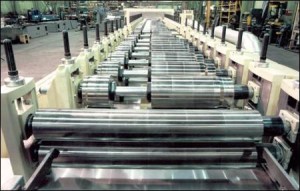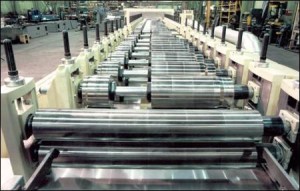The complete roll forming line can take one of two approaches to the processing of a particular part. It can be arranged to produce that part from:
- Precut lengths
- Coiled strip
Some parts demand the cut length approach; however, the most efficient, productive, consistent, and reliable arrangement is the coil fed line. It most often consists of a coil reel, roll forming machine, cutoff machine and run-out table. This basic roll forming line setup applies to the majority of installations in the world. A more complex arrangement may be required depending on the need for auxiliary operations, such as
- Prenotching
- Punching
- Embossing
- Marking
- Trimming
- Seam welding
- Spot welding
- Curving
- Coiling
If these operations are a part of the continuous forming process and there are minimal subsequent operating procedures, a custom line arrangement can be built so all actions are performed directly on the roll forming line. If there are customized parts or variation in procedure, it may be more cost-effective to have separate forming stations or machines that can be used in post-production and are specialized for the forming operation.
Figure 16 shows a 26-pass machine for producing a refrigerator panel from precut, trimmed, prepunched lengths.
Figure 17 is a typical basic, coil fed roll forming line using a coil reel, a 11-stand forming mill and a 4-post type pneumatic cutoff press.
Figure 18 shows a prenotch, form and cut line. As the diagram indicates, this includes not only a cutoff machine in place after the rolling machine, but a second cutoff that is used as a prenotch press in this case. It is preceded by a small stock straightener. Although this setup is typically used to develop a contoured end formation that cannot otherwise be produced after the shape is formed, it can be applied as a prepunch solution for many repetitive pattern combinations.






